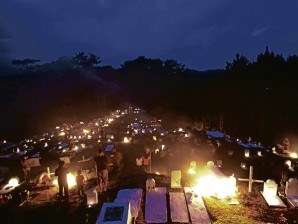
FIRE FOR THE DEAD. The people of Sagada, Mountain Province, gather in a cemetery for “Panag-apoy” (to make fire) at dusk. Combining Filipino practices with Anglican church rites, the ritual is intended to give warmth to the souls of the departed. RICHARD BALONGLONG/INQUIRER NORTHERN LUZON FILE PHOTO
MANILA, Philippines—An environmental group urged cemetery administrators to put up “eco-measures” that would remind the public to remain respectful of the dead and avoid turning graveyards into “instant landfills.”
EcoWaste Coalition asked private and public administrators to employ an adequate number of waste pickers, catch litterbugs, designate segregated trash bins, and possibly ban single-use plastic receptacles inside the cemeteries for this year’s commemoration of All Saints’ Day and All Souls’ Day.
The group made the call after observing that despite polite reminders, “cemeteries become instant landfills as millions pay homage to their departed loved ones.”
According to EcoWaste Zero Waste campaigner Christina Vergara, “Our tradition of visiting the graves of our deceased relatives and friends is oftentimes marred by wastes generated by the tons. This year’s Undas, we hope to see a more authentic expression of our respect for the dead by keeping the abode of their remains waste-free.”
She asked all cemetery administrators to guard against littering, open dumping and open burning of trash which violate the Ecological Solid Waste Management Act and other laws and ordinances.
EcoWaste suggested for them to keep the graveyards clean through eco-measures, such as: putting up signs reminding visitors to keep the cemeteries garbage-free by enumerating specific ways; going after litterbugs; and setting up segregation bins for waste in strategic areas.
The group said that it would also be advisable to establish material recovery stations for the storage of large volumes of segregated waste until it is sold or turned over to recyclers.
The group said that public and private cemetery administrators could hire waste pickers or recyclers who would be responsible for manning the materials recovery stations and segregation bin areas.
“As much as possible, prohibit single-use plastic disposables, such as bags, cups, straws, and the like, inside the cemetery premises or require cemetery-goers to take disposables and non-recyclable items back to their homes,” EcoWaste said, adding that vendors inside the cemeteries should be required to serve food and beverages only in reusable mugs and plates and to have their own trash bins.
EcoWaste added that an adequate number of personnel should be deployed before, during and after Undas to “take on the responsibilities in the upkeep, sanitation, and clean-up of cemeteries.”